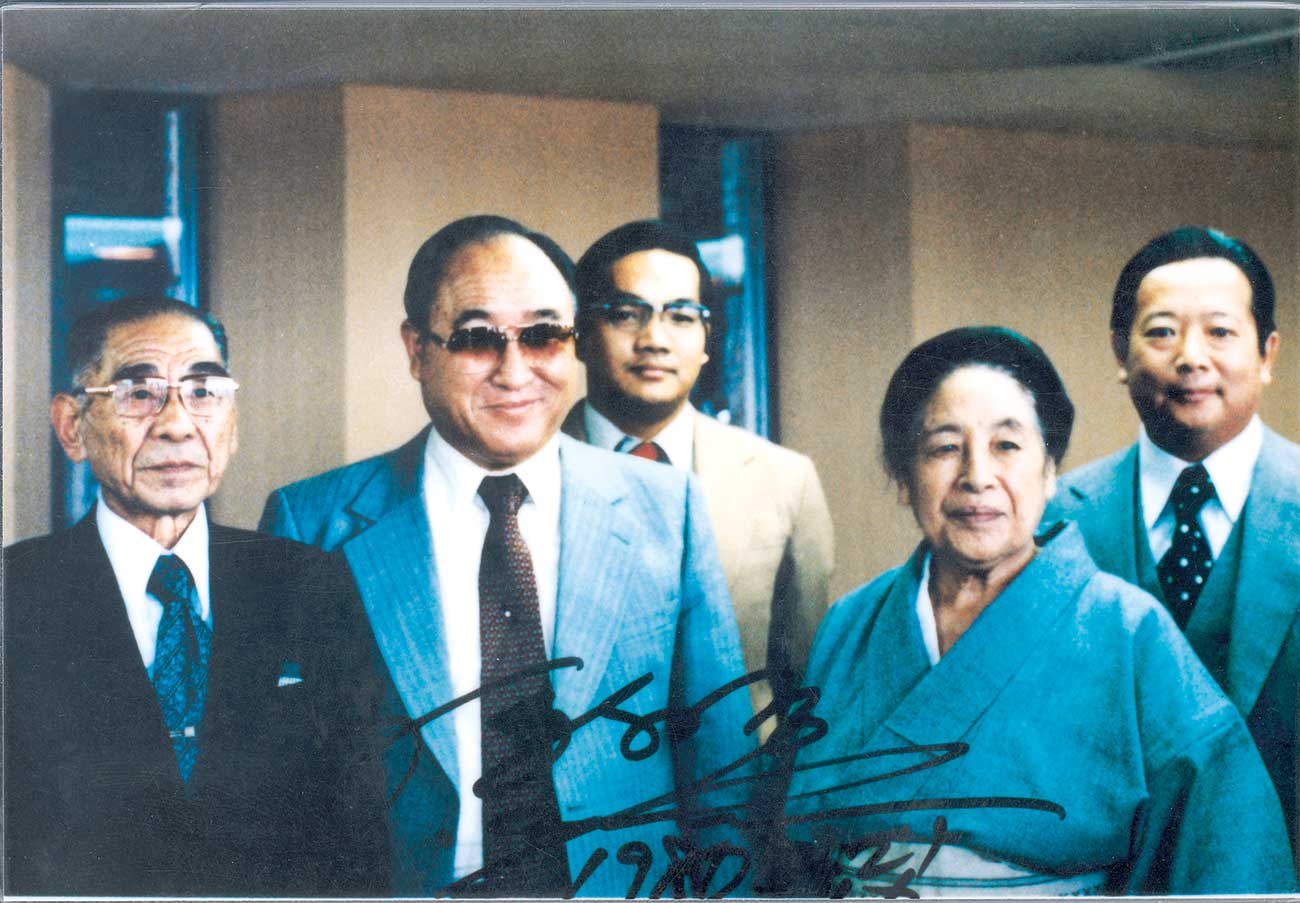I’d argue, asking, “What is the theory of evolution? What is it that Charles Darwin says is the origin of species?” My philosophy is love, and if you want to find out about the philosophy of love, you have to ask me.
Do you think I made up the philosophy of love, or discovered it? [You discovered it.] That’s right. I discovered the philosophy of love. I didn’t create it.
Furthermore, I am the philosopher of love. I am a philosopher who loves heaven and earth. We are solving, through love, the problems of the family, ethnic groups, and the world for the first time. This is the only thing I know. No matter how much you search through the spirit world or history, this is the only important thing.
And if you pass the test of love, the devil will retreat and God will welcome you.
Nobody has acknowledged my achievements in this area before. It has taken forty years for this to be acknowledged.
While I was in my twenties, I swore to God that I’d save this nation. I believed I represented all 30 million Koreans at that time and that my love for God was stronger than the love the Japanese people had for their emperor.
Based on that, I believed Japan would decline. They hit “goodness” first, so they had to decline. If falseness strikes goodness, it doesn’t gain from it.
When I was studying in Tokyo, I moved around a lot. Because I had a plan for the future, I went to many places. I thought, “Some time in the future, Japanese young people will rise again.”
I went everywhere to find out what scholars and workers were doing. Likewise, I went along numerous backstreets. I sent out secret messengers. I started my struggle from the moment I got off the train at Tokyo Station.
Furthermore, I didn’t say anything, but I spoke to the streets, “In the future, you will know what the Koreans have gone through.” Yet, I would rather not be merely patriotic. When I looked at the trees or I spoke to the creation, I said, “Oh, you are a part of an enemy land, but you will belong to God.”
God’s son became a heavenly soldier, a guerrilla to defeat the satanic world. That’s why there is nothing I don’t know. At school,l I met the person in charge of school business affairs and investigated all the school’s secrets. I knew what Japan was like, and I predicted how much longer Japan would last.
I even worked for high-level people. Furthermore, I did jobs for the college president. This was possible because I was good at writing. I was fully aware of the corruption and knew about the people who pulled strings behind the scenes.
You have probably never experienced the anguished sorrow of losing your nation. I have. When Korea was groaning under Japanese rule, I took part in resistance activities against Japan.
At that time, if any problem arose, all the Korean students in Japan called on me to solve it. They came to me. I was a district leader. So if things became earnest, they had me take care of things.
Compelled by righteousness, I committed my life. I am not a faint-hearted man. I crossed the sea from Japan to Korea and traveled in the undercarriage of a car for eight or nine hours from Busan to Andong as a representative of the provisional government.
Nowadays, the resistance leaders who were under Kim Gu in Beijing are becoming known, even in China. I took part in underground resistance activities as they did.
I worked in the underground movement and connected with the most capable people. Furthermore, I can remember that work as if it were only yesterday. I remember it so clearly because I invested my whole heart into it.
I was friendly with communists in my student years. We had a common purpose in fighting to overturn the philosophy that presented the Japanese emperor as a unique being. These communists were good friends and necessary comrades. Why did we go our separate ways? Their final goals and direction were opposite to ours.
Under constant surveillance
The police were always following me. If I returned to Korea, they would telephone to inform the authorities that I was coming. When I passed through the ticket barrier, they would be there to greet me with “Oh, so you have returned.”
I was a student, but I was a suspect under surveillance. Most people don’t know this about me. I was detained by the police on numerous occasions in those days. While I was staying in Tokyo, they called me to the police station at Waseda University, on Takadanobaba Street, once a month.
I was also tortured by the Japanese police when I was in my twenties. I continued to fight even under those circumstances. Furthermore, I was beaten and tortured, but remained resolute. I cannot forget this.
Loving Heaven even after loving your country
How can people say they love Heaven when they don’t love their country? I’ll have to recheck everyone. Those who do not love their country cannot love Heaven.
When Japan ruled Korea, the police followed me. The military police also followed me. When I went to North Korea, I had to struggle against the communists. In the southern part of Korea, too, I had to oppose the authorities. That was my destiny.
Did I go over their walls and plunder their belongings? Of course not. I loved this country and people more than anyone else did, and I worked harder than anyone for the Republic of Korea…. I have cried so much for this country. At that time, I shed so many tears that I can face any patriot without shame.
Overcoming hunger
Until I was thirty, not a day passed without my feeling hungry. I am well acquainted with suffering from hunger. Why did I do this? I had pledged myself to Heaven, and I had a mission given by Heaven.
As the person with this responsibility, who had not yet established the necessary foundation, how could I eat? When I looked at the rice, it shouted abuse at me. Are you aware of that world? The rice shouted at me. So I ate only enough to sustain myself….
I used to tell myself that to gain good things and eat good things, I must not eat much now. Even if I go to a restaurant, I never go to a good restaurant. In restaurants, I always sat in the worst seat, but not because I didn’t have any money. I was brooding over how I could set adequate conditions for me to feel prouder in front of God than anyone else could. That’s why I lived as I did.
Because it was wartime, we used food coupons. I had some coupons, so I went with my friends to find out how many bowls of rice we could eat. There was a temple in the Takadanobaba area surrounded by many restaurants.
One day, I ate seven bowls of rice containing chicken and egg at one of them. I couldn’t even move my neck after eating so much. It was even more terrible than being hungry. I couldn’t move. I have had that experience, but it is wrong to think that I always acted like that. For the most part, I was continually hungry.
If you are always full, you lose touch with the people, and you lose touch with God. I was hungry. I wanted to eat, but I was determined to love God and people more. This is the truth. It is my creed.
Try eating two meals a day for the next four years. All of you, try it. I ate only two meals a day from high school until I was thirty years old. I lived without eating three meals a day. Not a day went by that I wasn’t hungry. Sacrifice one meal a day for the world. That is a holy act.
Wearing old clothes, eyes downcast
Many of the clothes I wore were bought in a used clothing store. Some of the trousers I wore were the wrong size and shiny. Many people pay attention to their hair by getting a permanent, by blow-drying it, or by putting hair cream on it.
They say their hair becomes a mess when it is windy or when a typhoon blows. But I never did those things. I never put anything on my head in any kind of weather, in spring or summer.
On winter days, my gaze never rose higher than 45 degrees from the ground. When I walked around, I asked myself how somebody like me, who had not yet fulfilled the will of Heaven, could shamelessly strut along the street. I couldn’t do that without first paying the price and meeting all the requirements of heavenly law.
There were boys and girls, fellow students, wearing fancy clothes and acting with a superior air, who would ride on the same tram I did. I used to look at them and compare myself to them.
I would think to myself, “Beneath your laughter, your life, and your youth are passing you by; beneath my melancholy thoughts, a light is shining into life and the sun of hope is rising. My future is guaranteed and is full of hope, but for you, the future holds no hope.”
For the first thirty years of my life, I never wore new clothes. All of my clothes were secondhand. Why? I had to hide myself. I had to remain invisible. There was a time when I should emerge; I could not do so earlier.



